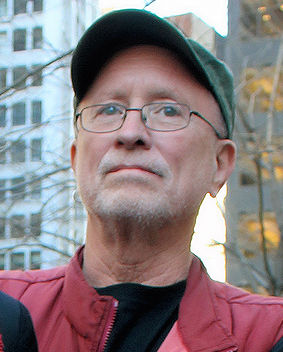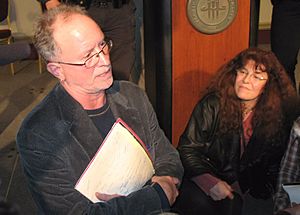Bill Ayers facts for kids
Quick facts for kids
Bill Ayers
|
|
|---|---|

Ayers in 2012
|
|
| Born |
William Charles Ayers
December 26, 1944 Glen Ellyn, Illinois, U.S.
|
| Education | University of Michigan (BA) Bank Street College of Education (MEd) Columbia University (MEd, EdD) |
| Known for | Founder of the Weather Underground Urban educational reform |
| Spouse(s) | Bernardine Dohrn |
| Scientific career | |
| Fields | Education |
| Institutions | University of Illinois at Chicago |
William Charles Ayers (born December 26, 1944) is a retired American professor who was a well-known activist in the 1960s and 1970s. In 1969, he co-founded a far-left group called the Weather Underground. This group wanted to create major changes in the United States.
The Weather Underground was strongly against the Vietnam War. To protest the war, the group set off bombs in several public buildings. These bombings did not kill or injure anyone. However, three members of the group died when a bomb they were building exploded by accident. The FBI called the Weather Underground a domestic terror group. Ayers had to hide from the police for many years. Eventually, the charges against him were dropped because of illegal actions by the FBI agents who were looking for him.
Later, Ayers became a professor at the College of Education at the University of Illinois at Chicago. During the 2008 U.S. presidential election, people talked about his past connection to candidate Barack Obama. News organizations like The New York Times and CNN looked into it. They found that Obama and Ayers did not have a close relationship. Ayers is married to Bernardine Dohrn, who was also a leader in the Weather Underground.
Contents
Early Life and Education
Ayers grew up in Glen Ellyn, a suburb of Chicago, Illinois. His father, Thomas G. Ayers, was the head of the big electric company Commonwealth Edison. Ayers went to public school until he switched to a private prep school called Lake Forest Academy. In 1968, he graduated from the University of Michigan with a degree in American Studies.
In 1965, Ayers attended a meeting at his university to protest the Vietnam War. A student leader named Paul Potter asked the audience how they would live their lives in a way that matched their values. Ayers later wrote that this question made him feel he had to take action. He believed that doing nothing was the same as not caring.
Ayers's activism started in 1965. He joined a protest against a pizza place in Ann Arbor, Michigan, that would not serve African Americans. He was first arrested for a sit-in protest at a military draft office and spent ten days in jail. Soon after, he began teaching at a small preschool. The school was part of the "free school movement," which focused on cooperation instead of competition. At 21, Ayers became the school's director.
The Weather Underground
Ayers became very involved in the New Left movement and the group Students for a Democratic Society (SDS). By 1968, he was a leader in the SDS. His group in Detroit later became part of the Weathermen.
The Weathermen eventually took control of the SDS in 1969. Ayers was elected as the group's Education Secretary. The group decided to use violent actions to protest against the government. They created small, secret groups in cities across the country.
Protests and Bombings
In 1969, Ayers took part in planting a bomb at a statue in Chicago. The statue honored police officers from an 1886 conflict. The explosion broke nearly 100 windows. The statue was rebuilt but was blown up again by other Weathermen a year later.
Ayers also participated in bombings at the New York City Police Department headquarters in 1970, the United States Capitol building in 1971, and the Pentagon in 1972. In his 2001 book, Fugitive Days, he wrote that the bomb at the Pentagon was small but caused a lot of damage. No one was killed or hurt in these bombings.
After a bomb accidentally exploded in a New York townhouse in 1970, killing three members, Ayers went into hiding to avoid being caught by the police. He and another member, Bernardine Dohrn, got married while they were fugitives. They used different names and moved around to avoid being found.
In 1973, it was discovered that the FBI had used illegal methods, like searching property without a warrant, to investigate the Weather Underground. Because of this, the government dropped the charges against Ayers and other members. Dohrn later turned herself in to the police in 1980. She was fined and given three years of probation.
Reflecting on the Past
In 2001, Ayers published a book about his life called Fugitive Days: A Memoir. He said he wrote it as his personal memory of that time, not as a history book. Some people have questioned how accurate the book is.
A lot of debate about Ayers started after an interview with The New York Times on September 11, 2001. He was quoted as saying, "I don't regret setting bombs" and "I feel we didn't do enough." Ayers later said his words were twisted. He explained he was only talking about his efforts to stop the Vietnam War, which he felt were not enough. He said he did not mean he wished they had set more bombs.
In a 2008 interview, Ayers said, "While we did claim several extreme acts, they were acts of extreme radicalism against property. We killed no one and hurt no one. Three of our people killed themselves." He has also said that he is against all forms of terrorism.
Career as a Professor
After his time as an activist, Ayers built a career in education. He earned master's degrees from Bank Street College and Columbia University. He also earned a doctorate in education from Columbia University in 1987.
Ayers became a professor at the University of Illinois at Chicago in the College of Education. His work focused on social justice in teaching and improving city schools. He wrote many books and articles about education. His book To Teach: The Journey of A Teacher won two awards.
In 2010, Ayers announced he would retire. The University of Illinois board voted not to give him the special title of "professor emeritus." The board's chairman, Christopher G. Kennedy, said he voted against it because a book Ayers co-wrote in 1974 was dedicated to a list of people that included Sirhan Sirhan, the man who was convicted of killing his father, Robert F. Kennedy. Ayers said he never dedicated a book to Sirhan Sirhan and that this was a false rumor.
Civic and Political Life
Ayers worked with Chicago Mayor Richard M. Daley on school reform. In 1997, he was named Chicago's Citizen of the Year for his work on a project that brought $49.2 million to the city's public schools. He also served on the board of the Woods Fund of Chicago, a foundation that works to fight poverty.
In 2009, Ayers was not allowed to enter Canada for a speaking event about education. A border agent told him it was because of a felony conviction from 1969. Ayers said he only had arrests for minor offenses, not felonies.
During the 2008 presidential campaign, his past connection to Barack Obama became a topic of debate. However, news reports found that the two were not close. Ayers later wrote that he was not closely associated with Obama.
Personal Life
Ayers is married to Bernardine Dohrn. They have two children, Zayd and Malik. They also raised Chesa Boudin, the son of their former Weather Underground friends Kathy Boudin and David Gilbert. Chesa Boudin later became the District Attorney of San Francisco. Ayers and Dohrn live in the Hyde Park neighborhood of Chicago.
Works
- The Good Preschool Teacher: Six Teachers Reflect on Their Lives, 1989
- To Teach: The Journey of a Teacher, 1993
- A Kind and Just Parent, 1997
- Fugitive Days: A Memoir, 2001
- Teaching Toward Freedom: Moral Commitment and Ethical Action in the Classroom, 2004
- Public Enemy. Confessions of an American Dissident, 2013
- Demand The Impossible: A Radical Manifesto, 2016
See also
 In Spanish: Bill Ayers para niños
In Spanish: Bill Ayers para niños
 | Georgia Louise Harris Brown |
 | Julian Abele |
 | Norma Merrick Sklarek |
 | William Sidney Pittman |


